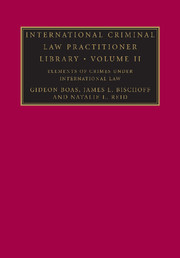Book contents
6 - Conclusion
Published online by Cambridge University Press: 10 December 2009
Summary
The elements of the core categories of international crimes discussed in the preceding chapters are the heart of substantive international criminal law. Through these elements, the constitutive instruments and judicial decisions of the courts and tribunals surveyed in this series seek to punish the most serious violations of international human rights and international humanitarian law by identifying, with the precision and consistency required of criminal law, the circumstances in which conduct breaches those norms.
These observations are subject to certain qualifications, however, and four in particular arise from the analysis in the preceding chapters. First, the elements of crimes are only one part of the equation that is tested at trial, and a nuanced understanding of international criminal law is impossible without an appreciation of the interaction between the crimes and the forms of responsibility through which individuals are held liable. It is thus crucial to understand the role that the context in which international crimes are almost invariably committed – especially the multiplicity of actors involved in their design and execution – plays in the development and application of appropriate definitions of the crimes.
Second, even though each court or tribunal has jurisdiction over most or all of the crimes discussed in this volume, the three core categories of crimes are often seen to be of varying importance in these judicial bodies.
- Type
- Chapter
- Information
- International Criminal Law Practitioner Library , pp. 370 - 386Publisher: Cambridge University PressPrint publication year: 2009



